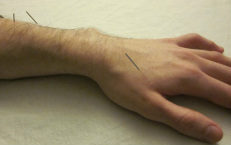Acupuncture and Traditional Chinese Medicine

Acupuncture is based
on the assumption that Qi or energy courses through the channels of the body.
Every organ network has a corresponding set of channels. The acupuncture points
are located in small depressions in the skin where the channels come closest to
the surface. With acupuncture these gates are opened or closed to adjust
circulation of Qi in the channels. Thin, sterile, steel acupuncture needles are
inserted into acupuncture points to mobilize Qi, moisture and blood, which invigorates the function of muscles, nerves, vessels, glands and organs.
Insertion of the needles goes unnoticed by some, and to others feels like a small pinch followed by a sensation of tingling, numbness, ache, warmth or heaviness. Some people feel Qi moving at a distance from the point of insertion. Needles remain in place for 15-30 minutes. Some notice a relief of the symptoms or feel more energetic in the days that follow treatment. Most people are pleased to find that sessions are not uncomfortable and even look forward to them.
While it would be most accurate to say that acupuncture treats disorders of Qi, blood and the organ networks, this does not correspond to the Western vocabulary of named diseases and conditions. Acupuncture may be helpful for chronic pain, withdrawal from addictions, stress reduction, post surgical recovery, chronic fatigue and decreased immunity. An extensive list of conditions for which acupuncture is considered appropriate is listed by the World Health Organization.
Traditional Chinese Medicine is a complete medical system that has diagnosed, treated and prevented illness for over two thousand years. While it can remedy ailments and alter states of mind, Chinese medicine can also enhance recuperative power, immunity and the capacity for work and creativity.
In the Traditional Chinese Medicine view, all of the creation contains within it Yin and Yang. These terms refer to the complementary but opposing qualities that make up everything in the natural world. Harmony of Yin and Yang means health while disharmony leads to disease. The strategy of Chinese medicine is to restore balance between Yin and Yang. Since our bodies are in dynamic balance internally as well as with nature, we are constantly making adjustments to maintain equilibrium. Perfect health is not some static state; instead, our bodies stay well by making changes in response to various influences. When we are unable to adapt, whether due to a change of weather or the invasion of a virus, we fall ill. We use acupuncture, herbs and food to recover and sustain health.
Insertion of the needles goes unnoticed by some, and to others feels like a small pinch followed by a sensation of tingling, numbness, ache, warmth or heaviness. Some people feel Qi moving at a distance from the point of insertion. Needles remain in place for 15-30 minutes. Some notice a relief of the symptoms or feel more energetic in the days that follow treatment. Most people are pleased to find that sessions are not uncomfortable and even look forward to them.
While it would be most accurate to say that acupuncture treats disorders of Qi, blood and the organ networks, this does not correspond to the Western vocabulary of named diseases and conditions. Acupuncture may be helpful for chronic pain, withdrawal from addictions, stress reduction, post surgical recovery, chronic fatigue and decreased immunity. An extensive list of conditions for which acupuncture is considered appropriate is listed by the World Health Organization.
Traditional Chinese Medicine is a complete medical system that has diagnosed, treated and prevented illness for over two thousand years. While it can remedy ailments and alter states of mind, Chinese medicine can also enhance recuperative power, immunity and the capacity for work and creativity.
In the Traditional Chinese Medicine view, all of the creation contains within it Yin and Yang. These terms refer to the complementary but opposing qualities that make up everything in the natural world. Harmony of Yin and Yang means health while disharmony leads to disease. The strategy of Chinese medicine is to restore balance between Yin and Yang. Since our bodies are in dynamic balance internally as well as with nature, we are constantly making adjustments to maintain equilibrium. Perfect health is not some static state; instead, our bodies stay well by making changes in response to various influences. When we are unable to adapt, whether due to a change of weather or the invasion of a virus, we fall ill. We use acupuncture, herbs and food to recover and sustain health.
